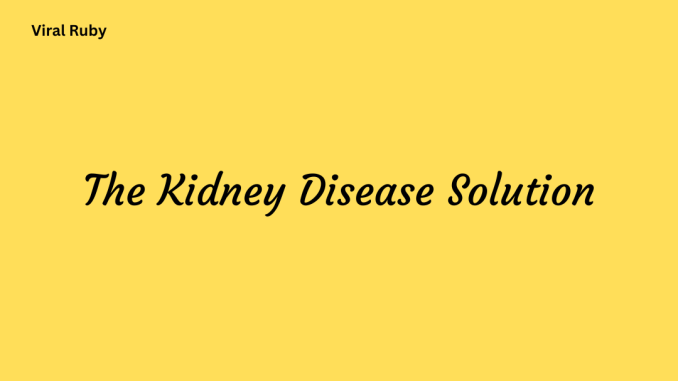
The Kidney Disease Solution Causes Symptoms Diagnosis and Success Stories
What Is Kidney Disease?
Kidney disease, also known as renal disease, is a condition that affects the functioning of the kidneys. The kidneys are important organs in the body that filter waste products from the blood and remove excess fluids, which are then excreted as urine.
Kidney disease occurs when the kidneys become damaged and are no longer able to perform their normal functions. This can be caused by a variety of factors, including high blood pressure, diabetes, infections, autoimmune disorders, and certain medications.
Symptoms of kidney disease can include fatigue, difficulty concentrating, swelling in the legs or feet, decreased urine output, and blood in the urine. If left untreated, kidney disease can lead to serious complications, including kidney failure, which can be life-threatening.
Treatment for kidney disease depends on the underlying cause and may involve medications, lifestyle changes, or dialysis, which is a procedure that uses a machine to filter the blood when the kidneys are no longer able to do so. In severe cases, a kidney transplant may be necessary.
Causes of Kidney Disease
Kidney disease, also known as renal disease, can be caused by a variety of factors. Some common causes of kidney disease include:
High blood pressure: High blood pressure can damage the blood vessels in the kidneys, making it difficult for them to filter waste products from the blood.
Diabetes: Diabetes can cause damage to the small blood vessels in the kidneys, making it difficult for them to filter waste products from the blood.
Infections: Infections such as pyelonephritis, a type of urinary tract infection, can damage the kidneys if left untreated.
Autoimmune disorders: Autoimmune disorders such as lupus can cause inflammation in the kidneys, which can lead to damage over time.
Certain medications: Some medications, such as nonsteroidal anti-inflammatory drugs (NSAIDs), can damage the kidneys if taken over a long period of time.
Genetic factors: Certain genetic factors can make some people more susceptible to kidney disease.
Obstructive causes: Blockages in the urinary tract, such as from kidney stones or tumors, can cause kidney damage over time.
Other causes: Other factors such as smoking, obesity, and a diet high in sodium and sugar can increase the risk of kidney disease.
Symptoms of Kidney Disease
Kidney disease, also known as renal disease, may not always cause noticeable symptoms in the early stages. However, as the condition progresses, the following symptoms may occur:
- Fatigue and weakness
- Swelling in the legs, ankles, feet, or face
- Decreased urine output or changes in urine color or frequency
- Difficulty concentrating or mental fog
- Loss of appetite or nausea and vomiting
- Trouble sleeping
- Itching or dry skin
- Muscle cramps or twitches
- Blood in the urine
- High blood pressure
- Shortness of breath
Diagnosis of Kidney Disease
Diagnosis of kidney disease typically involves several steps, including:
Medical history: Your healthcare professional will ask about your medical history, including any past illnesses or conditions that may contribute to kidney disease.
Physical exam: A physical exam may be conducted to look for signs of kidney disease, such as swelling in the legs or feet.
Blood tests: Blood tests may be done to measure levels of creatinine, a waste product that builds up in the blood when the kidneys aren’t functioning properly. Other blood tests may be done to measure levels of electrolytes, such as potassium and sodium, which can be affected by kidney disease.
Urine tests: Urine tests may be done to check for the presence of protein, which can be a sign of kidney damage.
Imaging tests: Imaging tests, such as ultrasound or CT scan, may be done to look at the structure of the kidneys and identify any abnormalities.
Biopsy: In some cases, a kidney biopsy may be done to obtain a small sample of kidney tissue for examination under a microscope.
The Kidney Disease Treatment Options
There are several treatment options for kidney disease, depending on the specific condition and the stage of the disease. Some common treatment options include:
Medications: Medications may be prescribed to help control blood pressure, reduce proteinuria (excessive protein in the urine), and manage other symptoms associated with kidney disease.
Diet and lifestyle changes: A healthy diet and lifestyle can help manage the symptoms of kidney disease and slow down its progression. This may involve limiting salt, protein, and potassium intake, as well as maintaining a healthy weight and staying physically active.
Dialysis: Dialysis is a procedure that removes waste products and excess fluids from the blood when the kidneys are no longer able to do so. There are two types of dialysis: hemodialysis and peritoneal dialysis.
Kidney transplant: In some cases, a kidney transplant may be necessary if the kidneys have failed completely. This involves surgically replacing the damaged kidneys with a healthy donor kidney.
Nutrition for Kidney Health
Nutrition plays an important role in maintaining kidney health. For people with kidney disease, it is essential to follow a balanced and healthy diet to help manage symptoms and slow down the progression of the disease. Here are some nutrition tips for kidney health:
Limit salt intake: Too much salt can increase blood pressure and cause fluid retention. This can put extra strain on the kidneys. Try to limit salt intake to less than 2,300 milligrams per day.
Control protein intake: Protein is important for building and repairing tissues, but too much can be harmful to the kidneys. People with kidney disease may need to limit protein intake. A healthcare provider can provide guidance on the appropriate amount of protein for an individual’s condition.
Watch potassium and phosphorus intake: People with kidney disease may need to limit foods that are high in potassium and phosphorus, as these minerals can build up in the blood when the kidneys are not functioning properly. Foods high in potassium include bananas, oranges, and potatoes, while high-phosphorus foods include dairy products and nuts.
Stay hydrated: Drinking enough water is important for kidney function. However, people with kidney disease may need to limit their fluid intake if they have fluid retention. A healthcare provider can provide guidance on the appropriate amount of fluid for an individual’s condition.
Avoid processed foods: Processed foods are often high in sodium and other additives that can be harmful to kidney function. Choose fresh, whole foods whenever possible.
Lifestyle Changes for Kidney Health
Making lifestyle changes can help improve kidney health and prevent further damage to the kidneys. Here are some lifestyle changes that can benefit kidney health:
Quit smoking: Smoking can damage blood vessels and reduce blood flow to the kidneys, which can lead to kidney disease. Quitting smoking can help protect kidney function and improve overall health.
Exercise regularly: Regular exercise can help lower blood pressure, improve heart health, and maintain a healthy weight, which can all benefit kidney health. Aim for at least 30 minutes of moderate-intensity exercise most days of the week.
Manage blood sugar: High blood sugar can damage the blood vessels in the kidneys and lead to kidney disease. People with diabetes should work with a healthcare provider to manage their blood sugar and prevent complications.
Manage blood pressure: High blood pressure can damage the blood vessels in the kidneys and lead to kidney disease. Lifestyle changes, such as exercise and a healthy diet, as well as medications, can help manage blood pressure.
Limit alcohol intake: Drinking too much alcohol can increase blood pressure and cause damage to the kidneys. People with kidney disease should limit their alcohol intake or avoid it altogether.
Manage stress: Chronic stress can contribute to high blood pressure and other health problems that can harm the kidneys. Practicing relaxation techniques, such as deep breathing, meditation, or yoga, can help manage stress and promote overall health.
Kidney Disease Solution Program Overview
The Kidney Disease Solution is a program designed to help people manage and improve kidney health naturally. The program was created by Duncan Capicchiano, a naturopath and kidney disease expert.
The Kidney Disease Solution program includes a variety of resources and tools, including:
A comprehensive guidebook: The guidebook provides information on the causes of kidney disease, as well as natural remedies and strategies for managing and improving kidney health.
Diet and nutrition guidance: The program includes guidance on a kidney-friendly diet, including foods to eat and avoid. It also provides recipes and meal plans to help support kidney health.
Lifestyle recommendations: The program includes recommendations for lifestyle changes, such as exercise and stress management, that can help improve kidney function and prevent further damage.
Supplement recommendations: The program provides information on natural supplements and herbs that can support kidney health, including dosages and potential side effects.
Personalized support: The program includes access to a team of kidney health experts who can provide personalized support and answer questions.
Science behind The Kidney Disease Solution
The Kidney Disease Solution program is based on a combination of scientific research and traditional naturopathic approaches to kidney health. Here are some of the scientific principles that underlie the program:
Diet and nutrition: Research has shown that a healthy diet that is low in salt, saturated fat, and processed foods can help improve kidney function and slow down the progression of kidney disease. The Kidney Disease Solution program emphasizes a kidney-friendly diet that is rich in fruits, vegetables, whole grains, and lean proteins.
Lifestyle changes: Lifestyle factors such as exercise, stress management, and quitting smoking can also improve kidney health. Research has shown that regular exercise can help lower blood pressure and improve kidney function, while stress management techniques like meditation and deep breathing can reduce the risk of developing kidney disease.
Natural remedies: The Kidney Disease Solution program includes information on natural remedies such as herbs, supplements, and essential oils that can support kidney health. Many of these remedies have been used in traditional medicine for centuries and have shown promising results in clinical studies.
Personalized approach: The Kidney Disease Solution program takes a personalized approach to kidney health, recognizing that each individual’s condition is unique. The program provides recommendations that are tailored to an individual’s specific needs and preferences, as well as guidance on working with a healthcare provider to develop a comprehensive treatment plan.
Success Stories of The Kidney Disease Solution Program
There are many success stories of people who have used The Kidney Disease Solution program to improve their kidney health. Here are a few examples:
Michael: Michael had been struggling with kidney disease for years and was facing the possibility of dialysis. After starting The Kidney Disease Solution program, he made changes to his diet and lifestyle, including exercising regularly and taking natural supplements. Over time, his kidney function improved and he was able to avoid dialysis.
Sarah: Sarah had been diagnosed with stage 3 kidney disease and was told by her doctor that there was little she could do to improve her condition.
After starting The Kidney Disease Solution program, she changed her diet and started taking natural supplements. Within a few months, her kidney function had improved and her doctor was amazed by her progress.
John: John had been on dialysis for several years and was looking for a way to improve his kidney function. After starting The Kidney Disease Solution program, he made changes to his diet and started taking natural supplements. Over time, his kidney function improved and he was able to reduce the amount of time he spent on dialysis each week.
These are just a few examples of the many success stories of people who have used The Kidney Disease Solution program to improve their kidney health. While everyone’s results may vary, the program provides evidence-based information and resources that can help individuals manage and improve their kidney health. It is always important to work with a healthcare provider to develop a comprehensive treatment plan.

Leave a Reply